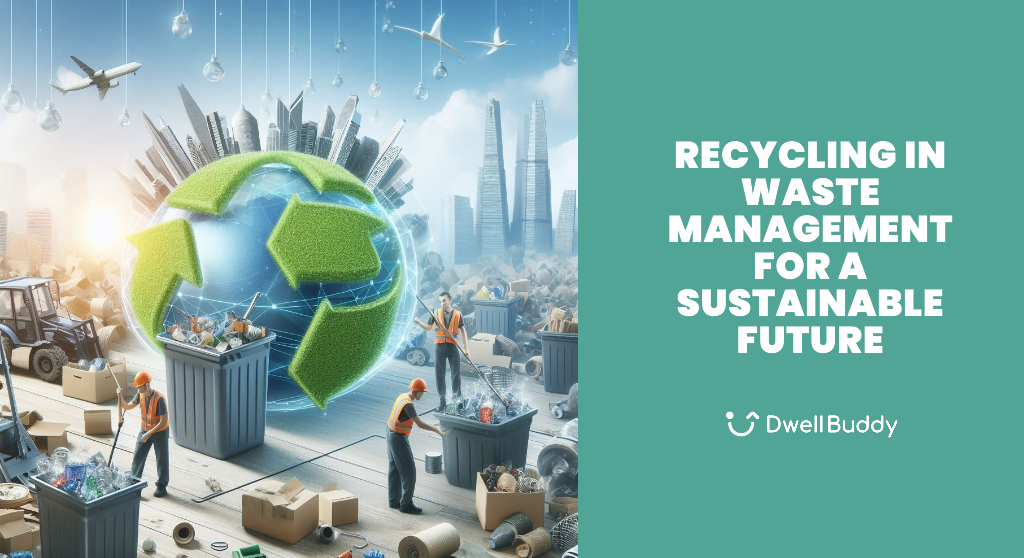
Recycling in Waste Management for a Sustainable Future
Waste management is more important than ever in today’s fast-paced world, with environmental challenges at the forefront. This article examines the critical function of recycling in trash collection, emphasising its importance, benefits, and shared duty in waste reduction.
In essence, recycling is more than just waste management; it plays an important role in environmental preservation, employment creation, and economic growth. Understanding its significance and supporting sustainable practices helps to create a healthy planet for current and future generations.
Importance of Recycling in Trash Collection:
1. Resource Conservation:
Recycling saves valuable resources by reusing materials such as paper, glass, metal, and plastic. For example, recycling used paper reduces the number of trees that need to be cut down.
2. Energy Savings:
Making things from recycled materials usually needs less energy than using raw resources. For example, recycling aluminium uses much less energy than getting and processing new aluminium.
3. Reduction of Landfill Usage:
Recycling plays a role in easing the pressure on landfills, making them last longer. For instance, plastics take a long time to break down; recycling lowers the amount that goes into landfills.
4. Economic Benefits:
Recycling industries not only help the environment but also create jobs and boost the economy. For instance, facilities that process recycled materials offer employment opportunities.
5. Environmental Impact:
Cutting down the need for raw materials helps reduce the environmental harm caused by extracting and processing them. For example, mining metals and drilling for oil come with significant environmental consequences.
Environmental Impact of Recycling: A Concise Overview
Recycling plays a vital role in preserving the environment, making a significant impact on reducing pollution and promoting energy conservation. By redirecting materials away from landfills and incinerators, it acts as a frontline defence, easing the burden on these pollution-prone sites and preventing the release of harmful substances into the ecosystem. This not only keeps the air cleaner but also lessens the load on incinerators, reducing air pollutants.
An illustrative example is the recycling of aluminium, a widely used material today. Opting for recycled aluminium instead of producing it conventionally from raw materials greatly lowers energy consumption. This environmentally friendly choice not only leaves a smaller carbon footprint but also represents a conscious effort to align human consumption with the well-being of the Earth. In essence, recycling goes beyond managing waste; it operates as a multifaceted guardian, protecting the planet from pollution and promoting energy efficiency.
Challenges and Solutions in Recycling
1. Contamination:
Contamination is a big challenge for recycling because mixed or contaminated materials make the process harder and lower the quality of recycled products. To tackle this, education is key. Public awareness campaigns should stress the importance of sorting things correctly and the bad effects of having contaminated recyclables. Also, using advanced sorting technologies in recycling facilities helps make the process more accurate.
2. Lack of Awareness:
A significant challenge in recycling arises from many individuals being unaware of its intricacies, resulting in improper disposal and reduced program effectiveness. The fundamental solution lies in education, achieved through public outreach programs, school curricula integration, and informational campaigns to enhance awareness. Offering clear guidelines on recyclable items helps address this challenge at its core, promoting a more effective and responsible approach to recycling.
3. Inadequate Infrastructure:
Outdated or insufficient recycling infrastructure poses a challenge to the efficient processing of recyclables, constraining overall recycling program capacity. The essential solution lies in investing in modern recycling facilities. Governments and private entities should allocate resources to upgrade existing infrastructure and establish new facilities equipped with advanced technologies. This proactive approach enhances the overall efficiency of recycling processes, ensuring a more effective and sustainable recycling system.
4. Lack of Participation:
Low public participation in recycling programs poses a challenge to their overall effectiveness, as the volume of recyclables collected remains suboptimal. To address this, incentivizing recycling through rewards programs, tax incentives, or community recognition can significantly boost participation. Engaging communities through initiatives and outreach campaigns plays a crucial role in instilling a sense of responsibility, encouraging individuals to actively contribute to recycling efforts and enhancing the success of recycling programs.
5. Technological Advancements:
Keeping up with technological advancements is crucial for efficient recycling as outdated technologies may result in lower processing speeds and less accurate sorting, posing a significant challenge. The solution lies in continuous investment in research and development. By adopting state-of-the-art sorting technologies, such as AI-powered machines, recycling processes can be improved, enhancing the accuracy and speed of material separation. This not only addresses the current challenges but also makes recycling more efficient and adaptable to the evolving nature of waste streams.
Innovations in Recycling Technologies
The world of recycling is always changing, thanks to amazing new technologies. One big change is the use of AI-powered sorting machines, which make sorting materials in recycling more accurate and faster. These machines, using artificial intelligence, can identify and separate materials very precisely, reducing mistakes and making the whole process more efficient.
These tech improvements don’t just make recycling better; they also make a big difference economically. AI-powered sorting machines make the recycling process more cost-effective by speeding things up and making it more accurate. This not only helps the environment but also makes recycling programs financially smart, ensuring their success and growth in the long run. Essentially, these technological advancements mark a new era in recycling, where innovation not only helps the planet but also makes economic sense.
The Future of Recycling: A Circular Economy
Looking ahead at how we handle waste, the idea of a circular economy is becoming important. This cool approach aims to reduce waste by focusing on reusing, sharing, repairing, and recycling things we already have. Imagine a world where resources keep going in a cycle, going back into making new things, and making the overall impact on the environment smaller. The circular economy doesn’t just think about a sustainable future; it changes how we see and take care of resources, making the path for a greener and more efficient tomorrow.
Final Thoughts
In wrapping up, recycling goes beyond just managing trash; it’s a key player in preserving the environment, creating jobs, and boosting the economy. To tackle the complexities of reducing waste, it’s crucial to embrace recycling both personally and in our systems. By understanding its importance and supporting sustainable practices, we all play a part in making the planet healthier for both present and future generations.

